Looking for alternate income stream, Singapore professionals put new spin on self-service laundromats
Once a passive income stream for retirees, laundromats are now emerging as side businesses for working professionals looking to turn them into spaces that offer more than just laundry services.
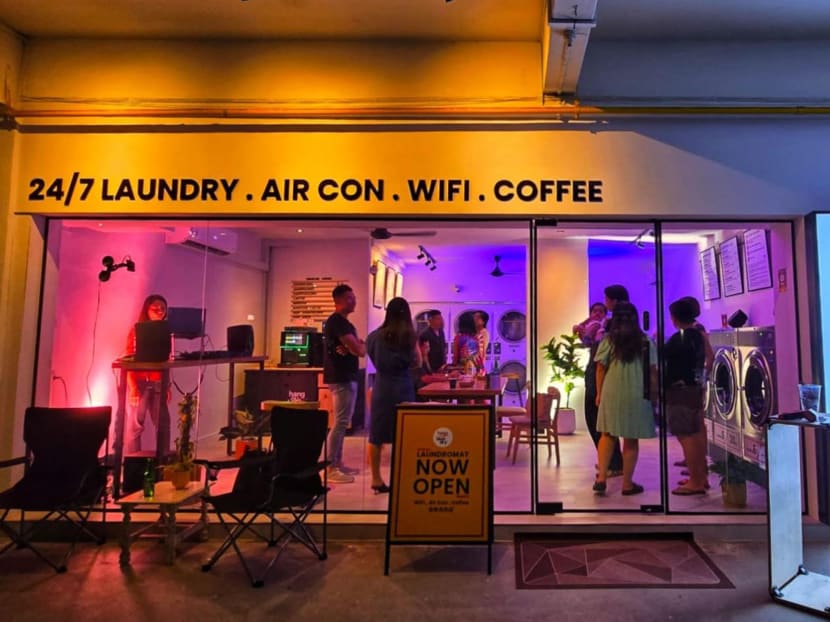
An event for singles to meet and mingle on Feb 14, 2025, held at laundromat Hangout Laundry in Bedok North. (Photo: Hangout Laundry)

This audio is generated by an AI tool.
When Ms Low Seow Yee received her insurance payout last year, the cancer survivor took a leap of faith and used it to start her first business: A laundromat.
“I’m blessed that I’m even in a position to do this,” the 46-year-old said.
Ms Low discovered her love for building spaces during her 10-year tenure at Timbre, a food-and-beverage (F&B), music and events company.
For a while, she had toyed with the idea of starting her own venture, but it was her stage-one breast cancer diagnosis in 2023 that pushed her to it.
As she returned to her corporate role after cancer treatment, she realised that it was time to live her life on new terms.
Having left Timbre, she now manages the laundromat alongside various side businesses that she did not want to reveal.
“I can probably stay in a corporate role, but I would always wonder what if I did something else? I don’t want to have any regrets when I’m on my deathbed.”
Why a laundromat? For Ms Low, the inspiration came from Celsious, a laundromat in the United States she came across online.
Based in Brooklyn, New York, the stylish set-up incorporates a co-working space with Wi-Fi and coffee, making waits more comfortable and productive. It also has a dedicated folding station, so customers may leave with a neat pile of laundry.
In December last year, Hangout Laundry was born in Bedok North, following Celsious’ formula and adapting it for Singapore’s market.
Earlier in 2024, Ms Low had spent two months surveying laundromat users across the country.
She noticed a recurring complaint: Laundromats in Singapore are hot and stuffy.
Her solution? Air-conditioning 24/7. This and the other amenities soon began attracting customers from neighbourhoods such as Tampines and Kembangan.
“Our customers love it. They’d dump their laundry, clear their email and have a coffee. And they leave feeling very productive that they’ve gotten so much done on a Sunday morning,” she added.
Even with air-conditioning, the pricing at Hangout Laundry is competitive. The cost for a 30-minute basic wash in a 16kg machine is S$7 and to dry, it is S$1 for every five minutes.
A check showed that these prices are similar to at least a couple of other non-air-conditioned laundromats located in public housing estates in southern and central Singapore.
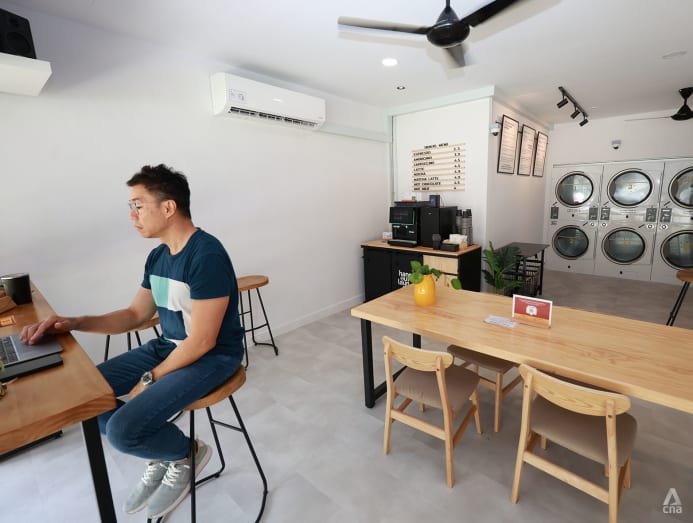
RIDING THE LAUNDROMAT WAVE
Ms Low is part of a group of Singaporeans reinventing the humble laundromat – once seen as a business that cash-rich retirees would start for passive income in their golden years.
Mr Willy Soh, co-founder of Fresh Laundry, said that demand for turnkey services – designed for entrepreneurs looking to start their own laundromats – has surged by more than 100 per cent between 2023 and 2024.
Fresh Laundry is an authorised distributor of self-service coin-operated laundry machines.
The 46-year-old noted that people have caught on to the growing popularity of self-service laundromats, driven by young couples who lack space for a dryer in newer, more compact apartments, as well as large families overwhelmed by endless laundry cycles.
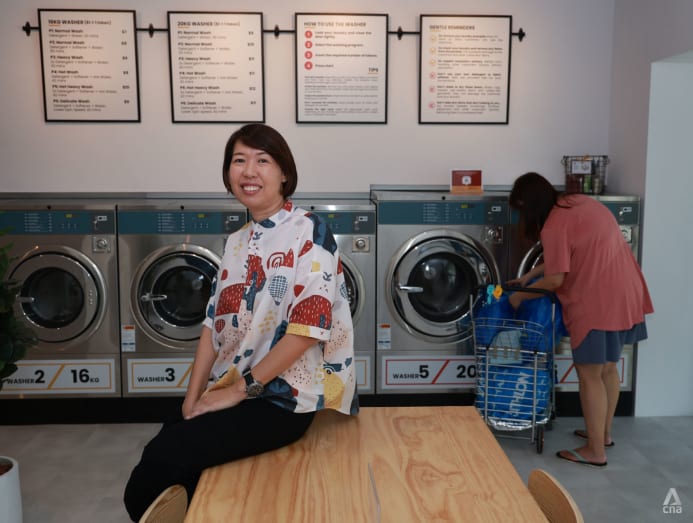
At Hangout Laundry, Ms Low sees older patrons who find doing laundry increasingly strenuous.
Novel as it may be, the question is whether a laundromat can generate enough income for it to be the operator’s primary livelihood.
Ms Low believes that it is challenging.
Consider the finances: A traditional laundromat costs about S$130,000 to start and delivers returns in three to five years, Mr Soh said.
Modern ones such as Hangout Laundry require more investment and take a longer time to turn a profit, Ms Low estimated.
“To be honest, running a laundromat is a long game,” she admitted, adding that a laundromat owner would have to scale the business for it to become a paymaster. The odds of achieving that with one or two outlets are slim, but not zero.
“I know of a few laundromats that make a low six-figure profit a year, but that’s because they keep a tight watch on their COGS (cost of goods sold, or the direct cost incurred) and they are in really good locations with high traffic and little competition.”
UNLOCKING NEW REVENUE STREAMS
Although the laundromat business is not exceptionally lucrative, it has captured the imaginations of people who perceive it as a “low-risk” investment, Mr Soh said.
Compared to an F&B business, for instance, a half-shop space with eight washers and dryers requires lower capital expenditure, while its unmanned nature keeps operating costs down.
Crucially, the domestic market has remained undisrupted for years, presenting an opportunity for new laundromat owners to rewrite the playbook.
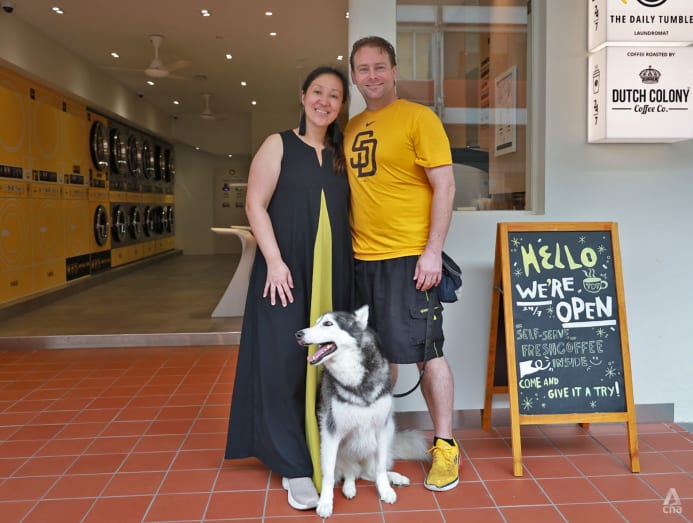
Take for example, The Daily Tumble, a side business started in September last year by Ms Yasmeen Chan, a 40-year-old who works in the non-profit sector, and her husband James Anderson, a 45-year-old professional in the technology sector.
They saw a gap in the market here when Mr Anderson moved to Singapore from the US with his two Siberian Huskies and they were struck by the scarcity of pet-friendly laundromats.
Often, the couple ended up dropping off the dogs’ accessories for professional cleaning.
“We were spending between S$60 and S$100 every month on pet laundry. Honestly, that’s a lot of money and we tend to not do it as often,” Ms Chan said.
This spurred the husband and wife to launch the laundromat alongside their day jobs, setting up shop in Aljunied after observing the high population of pets in that area.
At The Daily Tumble, machines labelled “special care” are reserved for pet accessories, a feature that has won the hearts of many “pawrents” living in the eastern part of the island and even some who were willing to drive all the way from the western region.
“We're super happy that the pet owners found it useful, because we really had them in mind when we designed everything,” Ms Chan said.
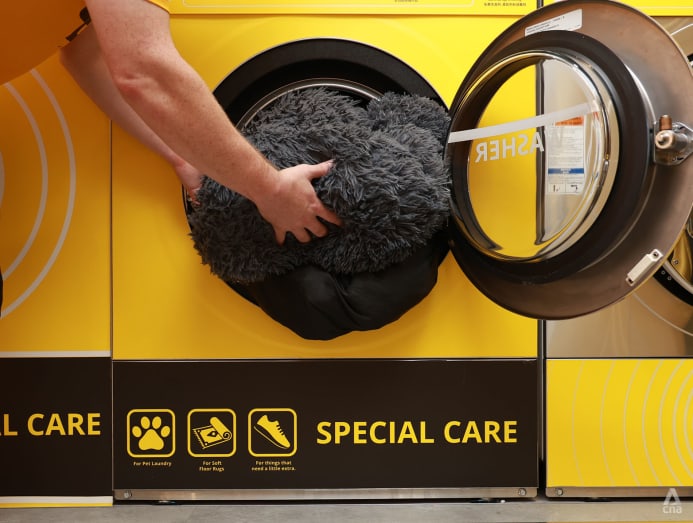
Convenience is just part of the appeal.
With its bright and airy design, the laundromat is often mistaken for a cafe, drawing the attention of passers-by and even swaying people who do not typically use laundromats to give it a try.
“There was this one couple who thought the shop looked interesting, but said that they had never used a self-service laundromat. Two hours after I spoke with them, they returned with enough laundry to fill five machines,” Ms Chan recalled.
While doing their laundry, customers may choose from a diverse menu that offers drinks ranging from kombucha to ginger beer, or get specialty coffee from Dutch Colony Coffee Co via a self-service machine.
Sipping a drink and scrolling through her phone while waiting has become a weekly ritual for Ms Noemi Ridzuan, who is a regular customer at The Daily Tumble.
“It feels like I'm going to a cafe but, at the same time, I'm getting this chore of mine done. I see it as a ‘treat’ for myself on the weekends,” the 33-year-old risk analyst said.
Mr Kenny Tan, 36, a commercial pilot, said that partnerships with vendors make laundry day more enjoyable for customers while also providing added revenue streams that help the business cover costs.
In June 2024, he launched The Good Husband Laundromats & Drycleaners in Changi to get some side income.
To date, he has teamed up with more than 20 vendors to provide specialised cleaning services such as shoe polishing and helmet sanitisation.
During their visits, customers can also relax in coin-operated massage chairs or buy a meal from the Instachef vending machine, which offers dishes such as fried carrot cake and black truffle pasta.
In the last quarter of 2024, some patrons even received haircuts while they waited, courtesy of a pop-up collaboration with a barber.
Mr Tan, already familiar with these vendors as a user, reached out to them after acquiring a unit of nearly 1,200 sqf – easily twice the size of traditional laundromats.
“I was given a unique and spacious space, so I had to be innovative about it. Making these amenities available round the clock not only adds value to laundromat users, but also the wider public,” he said.
Mr Tan disclosed that these vendors contribute 10 per cent to his total revenue and help with his utility bills, which can reach S$3,000 a month.
“If the trajectory from the past eight months continues, I may break even in fewer than two years. Maybe even in a year-and-a-half.”
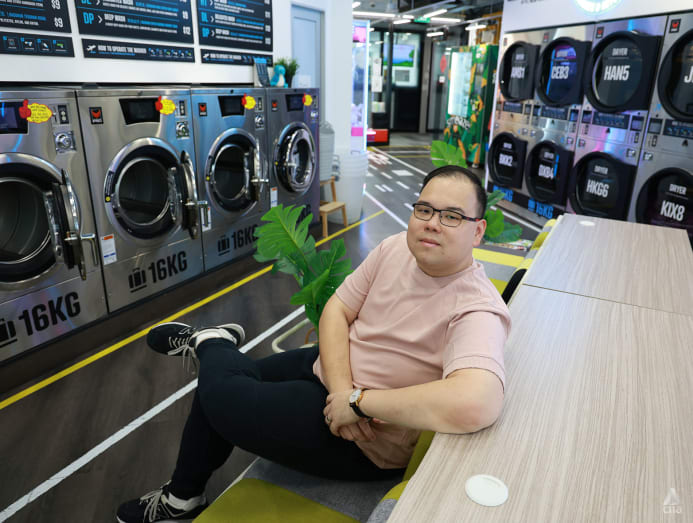
Although he intentionally situated the laundromat near his home in Changi for easier management, Mr Tan was at first sceptical about the choice of location and its potential to generate profit.
Conventional wisdom suggests that laundromats thrive in public housing estates, yet his was nestled among condominiums and landed private properties.
However, he focused heavily on the user experience and, coupled with the aforementioned services provided, it has been bearing fruit.
Having used a fair share of laundromats around the world as a pilot, he drew inspiration from Japan’s high-tech systems for laundromats and invested in IPSO, a mobile application developed by the machine supplier Alliance Laundry Systems based in the US.
With this app, customers can check from home whether machines are available for use before heading down to the shop – a feature valued by busy professionals such as Ms Alicia Teo.
“I like how I can plan my schedule around it and it saves me a lot of time,” the 37-year-old investment manager said.
“After dumping my laundry there, I usually get orange juice from the iJooz machine in the laundromat or head down to the supermarket to do my groceries.”
With the app, if customers arrive to find all machines in use, lockers enabled by artificial intelligence offer a convenient place to store their laundry until one becomes available.
These lockers also store uncollected laundry after a cycle, helping to reduce waiting times and improve turnover.
However, this means that the laundromat cannot operate solely on automation. Workers are needed to transfer clean laundry and occasionally help customers learn to use the app.
To address this, Mr Tan employs part-time workers during peak hours.
“I try to provide work for elders, so my oldest staff member is 72 years old. And if she can use the app, everyone can use it.”
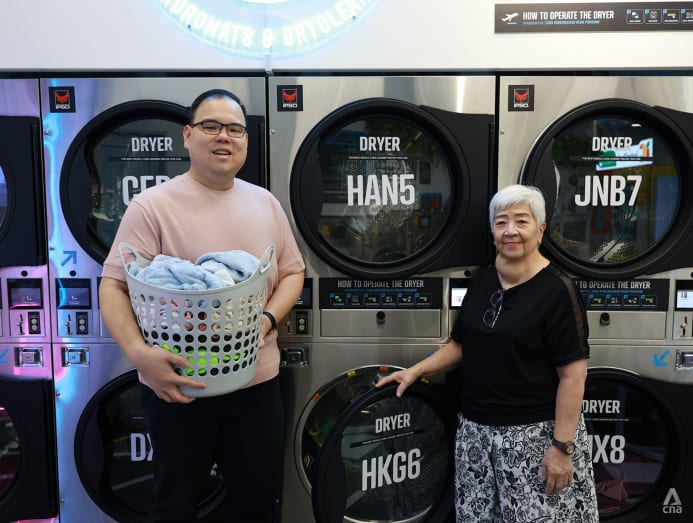
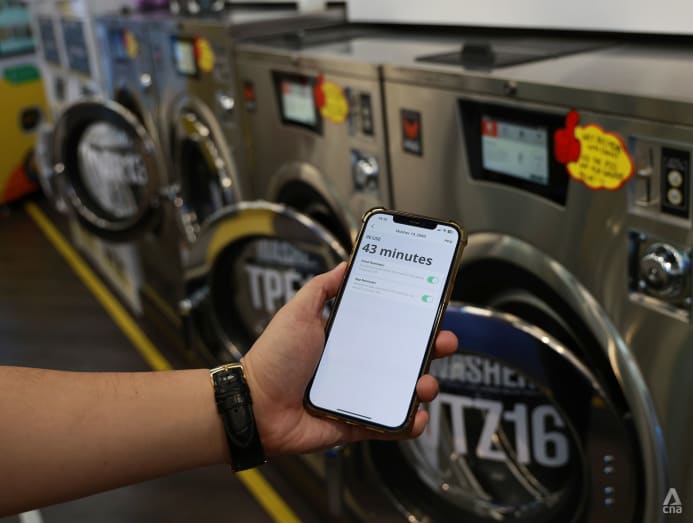
BRINGING PEOPLE TOGETHER
A laundromat may look like an automated business, but behind the scenes, work continues to minimise hiccups and ensure customer satisfaction.
When Mr Tan is overseas for work, he remains connected to his phone to ensure smooth operations, resolving technical issues when coins are inserted into the wrong slots and handling lost-and-found enquiries.
At The Daily Tumble, Ms Chan disinfects the machines up to three times a week to give customers peace of mind.
Clearly, the innovations of modern laundromats have made it such that it is not just a passive income-generator.
“People want passive income, but when things are passive, they’re also less well-maintained. There’s a trade-off, so don’t get sucked into the idea that it’s 100 per cent passive,” Ms Low warned those who are thinking of doing the same.
As the three entrepreneurs experiment with new ways to run a laundromat, they are also discovering its potential as a communal space.
This past Valentine’s Day, Ms Low hosted a dating mixer at Hangout Laundry, where people enjoyed beer, games and live music with a deejay. One game even had participants folding laundry while blindfolded, definitely not your usual laundromat experience.
“People who didn't come together were talking to one another. I’d love it if someone emails me down the line to say, ‘Hey, I met my partner at your laundromat!’,” Ms Low quipped.
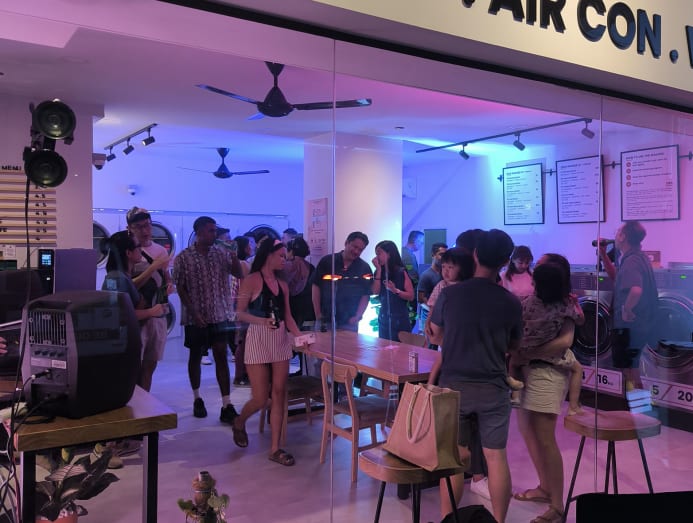
At the start, Ms Low was warned that 24/7 air-conditioning and a coffee machine might attract the wrong crowd who would make a mess, but the opposite happened.
Closed-circuit television footage installed for security and surveillance often shows customers tidying up and helping newcomers use the machines.
“It’s heartening to know that when you give people a nice space, they really take care of it,” she said.
At The Daily Tumble, the space is shaped by the community. Customers contribute children’s books to a mini-library, keeping little ones entertained and giving parents a break.
Even the music playlist has some customer input. When one patron requested an Ed Sheeran song, Ms Chan added it, earning a heartfelt thank-you for listening to feedback.
“It’s really about creating a space where people go, ‘Hey, this is my laundromat, too. It’s not just a place I go to do laundry’. They feel like they’re part of it, which we love,” she said.
Just as customers now have something to look forward to on laundry day, the owners find joy in connecting with them on a personal level.
For Mr Tan, whose job mostly confines him to a cockpit, meeting new faces and hearing their stories when he visits the shop is a rewarding change of pace.
“A customer spent two hours talking to my 72-year-old staff member and said that she reminded her of her late mum. These things just make you think, ‘Wow, I didn't know I could achieve that with this business’.”














